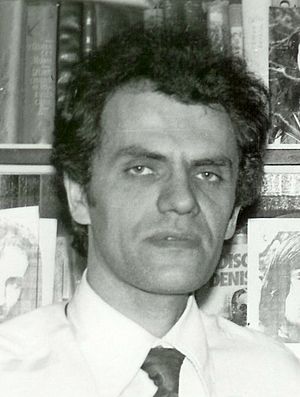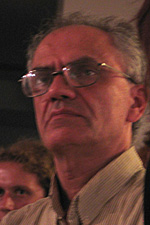Alexander Vustin facts for kids
Alexander Kuzmich Vustin (born April 24, 1943 – died April 19, 2020) was a Russian composer. He was also known as Voustin or Wustin. His musical pieces, including his famous opera The Devil in Love, were performed and recorded all over the world.
Contents
About Alexander Vustin
Alexander Vustin began his music studies with Grigory Frid at a local music college. Later, he continued his education at the Moscow Conservatory, where he studied with Vladimir Ferè. He completed his studies in 1969.
After finishing school, Vustin worked as a music editor for USSR Radio from 1969 to 1974. From 1974 onwards, he worked as an editor at a publishing company called Kompozitor.
Vustin's Music Style
Vustin started writing music in 1963. However, he only considered the pieces he wrote after 1972 to be his true works. His music has a very special and organized sound.
He used a method called the twelve-tone technique, but he used it in his own unique way. This technique helps composers create music using all twelve notes of the musical scale in a specific order.
Important Musical Works
Some of Vustin's early important pieces were created in the mid-1970s.
- The Word (1975) was an eight-minute piece for woodwind and brass instruments, plus percussion. He dedicated it to his teacher, Grigory Frid.
- In Memory of Boris Klyuzner (1977) was a three-minute piece for a baritone singer and a string quartet. It used words written by Yuri Olesha.
- Blessed are the Poor in Spirit (1988) was composed for a boy-soprano (or a high male voice) and a small group of instruments. The words came from the Bible.
The Opera: The Devil in Love
One of his most important works is the opera The Devil in Love. It is based on a French novel by Jacques Cazotte. Vustin worked on this opera for 15 years, from 1975 to 1989.
The music from this opera also inspired many other pieces he wrote around the same time. The opera was first performed on February 15, 2019, in Moscow. Vladimir Jurowski conducted the performance.
Performances and Collaborations
Alexander Vustin's music was often played at major music festivals around the world. These included festivals like the Holland Festival and the Donaueschinger Musiktage.
Many famous conductors and musicians performed his works. Some of these included Vladimir Jurowski, Gidon Kremer, and the BBC Symphony Orchestra.
Alexander Vustin passed away in Moscow on April 19, 2020. He died from pneumonia, which some sources reported was related to COVID-19.
List of Works
Vustin's music was published by Hans Sikorski. Here are some of his compositions:
- Three Poems of Moses Teif for bass voice and piano (1965)
- String Quartet (1966)
- Symphony (1969)
- Three Toropets songs for piano (1972)
- Nocturnes for a small group of instruments and high voice (1972–1982)
- Sonata for six for various woodwind and string instruments (1973)
- Lamento for piano (1974)
- Toropets Songs for ensemble (1975)
- The Word for winds and percussion (1975)
- Capriccio for voice, male voices and ensemble (1977–1982)
- In memory of Boris Klyuzner for voice and string instruments (1977)
- Memoria-2, a concerto for percussion, keyboards and strings (1978)
- Fairy Tale (Skazka) for solo oboe (1979)
- Homecoming for voice and 13 instruments (1981)
- The Leisure Time of Kozma Prutkov for baritone and percussion (1982)
- Hommage à Beethoven (Posvyashchenie Beethovenu) concerto for percussion and chamber orchestra (1984)
- Festivity (Prazdnik) for children's choir and orchestra (1985)
- Blessed are the poor in spirit for countertenor and chamber ensemble (1988)
- Devil in Love (Le Diable amoureux or Vlyublyonny dyavol), opera (1985–1999)
- Action from Luigi for a drum ensemble (1990)
- White music for organ (1990)
- Zaitsev's Letter for voice, strings, snare drum and tapes (1990)
- Music for the film for percussion and orchestra (1991)
- Music for Ten (1991)
- Heroic lullaby for ensemble (1991)
- Dedication to the Son (Posvyashchenie synu) for flute and ensemble (1992)
- Three Songs from the novel "Chevengur" by Andrei Platonov for voice and ensemble (1992)
- Agnus Dei for mixed choir, percussion and organ (1993)
- Little Requiem (Kleines Requiem) for soprano and string quartet (1994)
- Music for an Angel for saxophone, vibraphone and cello (1995)
- Song from the novel "Chevengur" for chorus and orchestra (1995)
- Disappearance for bayan, cello and string orchestra (1995)
- Fantasia for violin and orchestra, dedicated to Gidon Kremer (1996)
- Tango "Hommage à Guidon" for violin, string orchestra and percussion (1997)
- Piano Trio (1998)
- Mark Pekarsky's Birthday for a percussion ensemble (1998)
- The Light of the Silent (1999)
- Praise the Earth for children's voices and chamber orchestra (1999)
- Veni, Sancte Spiritus for choir, percussion and ensemble (1999)
- Canto for a singing string trio (1999)
- Alone for the vibraphone solo (2000)
- Sine Nomine for orchestra (2000)
- Night mist for chorus and chamber orchestra (2001)
- To Sofia for a voice and an ensemble, dedicated to Sofia Gubaidulina (2001)
- Epigraph for organ (in memory of Edison Denisov) (2001)
- Voice for alto solo (2001)
- The Seventh Word for the ensemble (2002)
- Spem in alium for piano, voices and ensemble (2003)
- Postlude for the ensemble (2003)
- Eve's Exposure (Look No. 5) for orchestra (2004)
- The Offering for the ensemble, dedicated to Gidon Kremer in memory of Dmitri Shostakovich (2004)
- Credo, for the ensemble (2004)
- Evening Birds for string trio (2006)
- Theater for voice and ensemble (2006)
- Far Light for bass clarinet solo (2007)
- Musical sacrifice for cello and piano (2007)
- The Search for Sound for solo bells and orchestra (2008)
- Canticum canticorum (Song of Songs) for voices and ensemble (2010)
- Litany, for percussion, voices and organ (2011)
- From the Life of the Elves for piano, violin and cello (2011)
- Wind for the choir and instrumental ensemble (2012)
- The Evening Sea for a singing string trio (2012)
- Dedication for cello, percussion and piano (2013)
- In memory of Grigory Frid for viola and piano (2014)
- The Song of Lukerya for magnetic tape, folk voice and orchestra (2015)
- The Song of the ascent for orchestra and voices (2016)
- Three poems of Olga Sedakova for bass and orchestra (2017)
CDs
Here are some CDs that feature Alexander Vustin's music:
- Kremerland
- Release Date: October 12, 2004
- Label: DEUTSCHE GRAMMOPHON
- Includes: Alexander Vustin: Tango hommage à Gidon, performed by Gidon Kremer and Kremerata Baltica.
- Russian Saxophone
- Label: BIS, CD-765 Digital
- Release Date: September 17, 1996
- Includes: Alexander Vustin: Musique pour l'ange (1995), for tenor saxophone, vibraphone & cello.
- An Introduction to Alexander Wustin
- Label: Megadisc, MDC 7845
- Includes: The Word (1975), Blessed are the Poor in Spirit (1988), Music for Ten (1991), To my Son (1992), Heroic Lullaby (1991).
- Alexander Wustin – Memoria 2, Agnus Dei, Sine Nomine
- Label: Thorofon, CTH 2486
- Includes: Memoria2 (1978), Song from the novel "Tchevengur" (1995), Hommage a Beethoven (1984), Agnus Dei (1993), Sine Nomine (2000).
See also
 In Spanish: Aleksandr Vustin para niños
In Spanish: Aleksandr Vustin para niños
 | John T. Biggers |
 | Thomas Blackshear |
 | Mark Bradford |
 | Beverly Buchanan |



